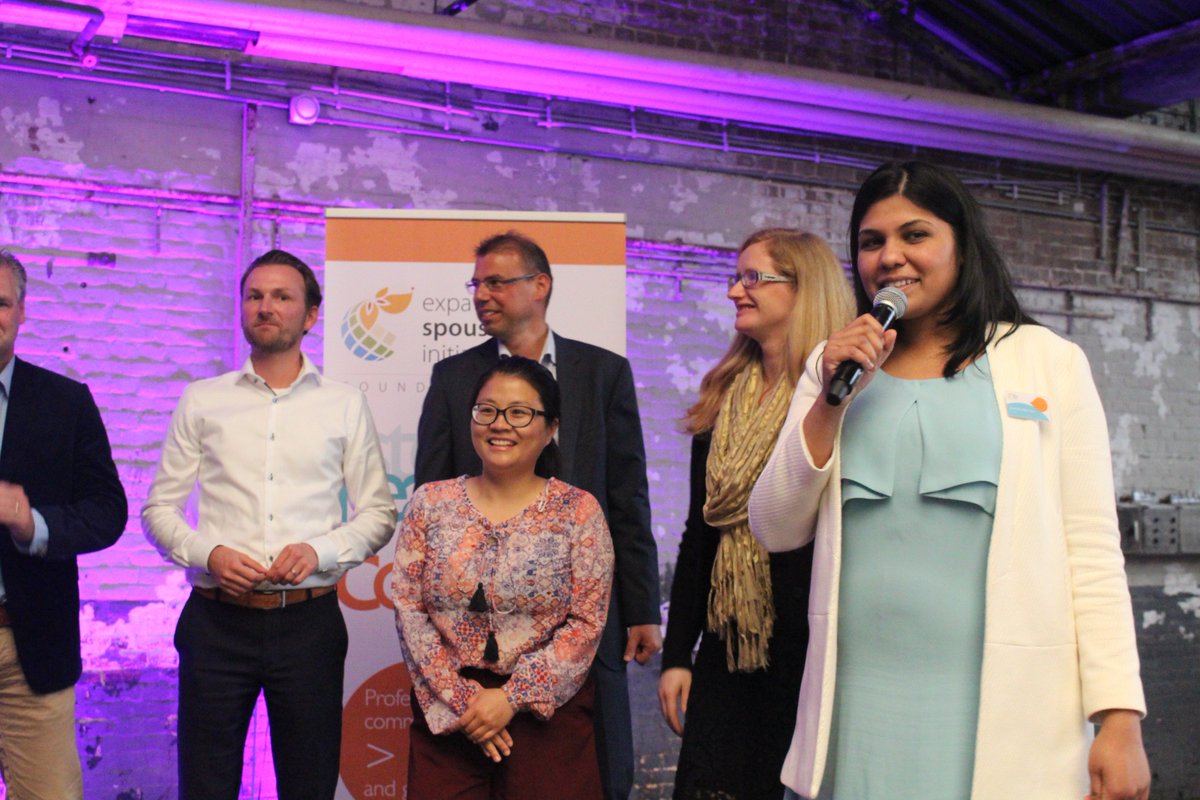(Editor’s note: The is the fourth in a series of posts about innovation in Eindhoven and the Netherlands. This post has been updated with new information. The first version contained an incorrect number related to Eindhoven economic development officials’ goal of doubling the population of international highly skilled workers here. )
Being what’s termed a “trailing spouse” in the corporate world can be both a blessing and a curse.
 The typical journey to becoming a highly skilled expat begins “when you think of it as this nice trip your’re taking,” said Kavitha Varathan. “Which was my situation.”
The typical journey to becoming a highly skilled expat begins “when you think of it as this nice trip your’re taking,” said Kavitha Varathan. “Which was my situation.”
Varathan is an architect who came to Eindhoven, Netherlands eight years ago from India with her husband, an engineer at Philips, the Amsterdam-based global electronics giant. Spouses tend to see the first six months of an assignment as almost an extended vacation during which the family gets settled and does a little traveling, Varathan said. “By the time you decide you’re bored … there’s a gap in your CV.”
Like so many entrepreneurs, Varathan and fellow Eindhoven expat Anne Yianni, from Germany, saw not a problem in the complications of global talent mobility, but a huge opportunity, founding Expat Spouses Initiative. The initiative grew out of their personal desire to not let their own careers founder. It’s a problem so many companies can’t seem to solve themselves — how to keep spouses not just content but working and sustaining their own careers while following husbands, wives or significant others to overseas corporate postings.
An overseas assignment can be hard on all parties: executives, spouses and the companies. Research shows about 40 percent of those assignments end early at least in part because spouses want to return home. Immigration laws bar them from working, or language barriers or societal norms make it difficult, if not impossible, for them to pick up their careers.
A bored, frustrated spouse aching to go home way before the assignment is over is not a good thing. The cost of replacing top C-suite or management talent can be stunning – from about $50,000 to well over $1 million, according to studies by Oxford University and other academic researchers.
Unless you live in Eindhoven, where the Eindhoven Expat Spouses Initiative is emerging as a global corporate game changer.
Founded in 2014, the Expat Spouses Initiative already has 700 members, with increasing corporate curiosity about the group’s formula, Varathan and Yianni said. More astoundingly, ESI has already placed 44 people in new careers.
Of course, co-founders Varathan, CEO, and Yianni, COO, say Eindhoven is in many ways the perfect locale to develop a model to solve this corporate conundrum.
A unique set of circumstances
Eindhoven has an estimated 37,000 knowledge migrants such as engineers and physicists working at such ultra-high-tech firms as ASML, which makes photolithography systems that etch integrated circuitry onto computer chips, and NXP, a global semiconductor company. Unlike visa rules in Germany or Belgium, Dutch law doesn’t prohibit spouses from working, which is a plus. But what really makes Eindhoven fertile ground for Varathan’s and Yianni’s initiative is city leadership.
That and the fact there are an estimated 9,000 highly skilled internationals in the Eindhoven region who aren’t participating in the workforce. One-in-five has a masters-level degree, and many have doctorates and even double-docs, Varathan said.
The founders originally saw the Expat Spouses Initiative as a civic effort, working their own social networks to recruit their first members. They put on small events to form a professional network. ESI attracted 200 people within two months. “The cause is very personal at one level,” Varathan said. “People almost immediately relate to it.”
Then, city officials got involved.
“The city was super proactive,” Varathan said. “We were surprised. We didn’t particularly reach out, but they were very responsive.”
Eindhoven city government, Technical University Eindhoven, Brainport developmen, Holland Expat Center South in Eindhoven and several companies facilitated a meeting, she said. Then Varathan applied for a last-minute grant as an alumnus of Technical University Eindhoven. “We won it … 9,000 euros.
“Suddenly, it was super serious.”
It happened super fast
The super-serious part started, Yianni said, with an October 2015 roundtable with city officials. By November, they had the grant. By January, they’d started a collaboration with HighTech XL, the hardware accelerator at Eindhoven’s fabled High-Tech Campus, where some of the world’s biggest tech companies including IBM and Intel have offices.
As of September, the 9-person Expat Spouses Initiative staff is working with about 20 companies and several startups.
- One of the big innovations to come out of Yianni’s and Varathan’s efforts is the Professional Empowerment Program and its PEP teams. Those teams are aligned with a developing recruitment infrastructure. There are eight PEP teams working in several verticals including marketing and communications. (Most have expertise in b2b and web marketing). They are working on real assignments, helping small businesses come up with marketing plans to boost revenue. PEP teams connect ESI members with people with similar ideas and interests, then bring in mentors and experts on the way to generating revenue.
- Another developing innovation is an effort to position the Eindhoven Expat Spouses Initiative to function as a de facto recruitment agency, educating companies about an undiscovered resource … men and women with serious skills, looking for opportunities but perhaps lacking a professional network. ESI takes a fee for allowing companies to recruit from its roster of talent … internationals with strong backgrounds in myriad talent categories including finance, tech and industrial design.
There is a PEP web-development team and a team working with the Eindhoven city government. Which is fitting because Eindhoven has what Varathan calls “a very worked-out plan” to double the number of internationals to 80,000 from almost 40,000 during the next three-to-five years. Apparently 80,000 is the number economic-development officials project in a skills surfeit based on the number of students in the Netherlands, the number of people people retiring, and estimated job growth and talent requirement for companies.
“They see a gap, and this gap can only be filled with Internationals,” Varathan said.
All this is cool … but the secret sauce at ESI is Yianni’s and Varathan’s molecular understanding of the trailing spouse life, and their intimate connections to so many people like themselves. And on some level, they’re selling tough love.
Neither side – internationals nor employers – understand the big picture of global mobility, Varathan said. “Companies are always looking at (the trailing spouse issue) like, ‘What can I give this employee to keep their family happy for two years?’ They treat expats like an odd stupid child. But the worst part is expats buy it.”
“Even we didn’t get it. We encourage them to be self-driven, to set their own goals, then see what they achieve.”
Co-CEO of Dispatches Europe. A former military reporter, I'm a serial expat who has lived in France, Turkey, Germany and the Netherlands.
















